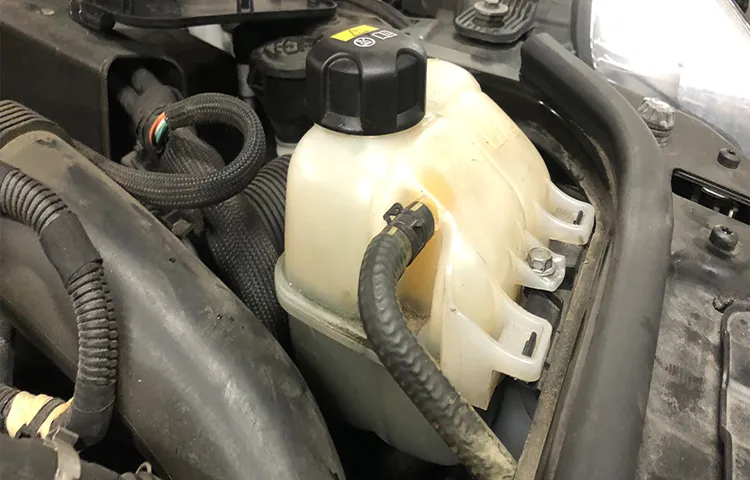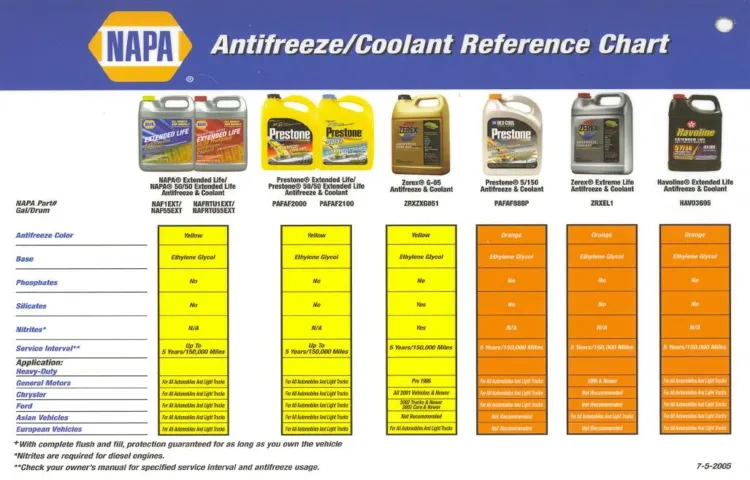Does your car need coolant? Are you wondering what coolant it takes? Choosing the right coolant for your vehicle is essential to keep it running smoothly and avoid costly damages. Coolant, also known as antifreeze, is responsible for regulating the engine’s temperature and preventing it from overheating. But not all coolants are the same.
Different cars require different types of coolant, and using the wrong one can cause severe damage to your vehicle. In this guide, we’ll help you figure out what coolant your car takes and why it’s crucial to use the correct one. So buckle up, and let’s dive into the world of coolants!
Table of Contents
Why Coolant is Important
If you’re wondering what type of coolant your car takes, it’s essential to know that using the wrong type can have disastrous consequences for your engine. Simply put, coolant is the fluid that flows through your car’s engine, helping to keep it cool and functioning properly. It’s important to use the right type of coolant for your car, as different vehicles require different formulas to work correctly.
There are several types of coolants on the market, including OAT (organic acid technology), HOAT (hybrid organic acid technology), and IAT (inorganic acid technology). Each has its unique properties and is recommended for particular types of vehicles. Checking your car’s manual will give you the information you need to ensure you’re using the right coolant.
Simply put, using the correct coolant is crucial to the health and maintenance of your car’s engine, so it’s essential to make sure you’re getting it right.
Prevents overheating
Coolant is a crucial component of any engine as it helps prevent overheating. When an engine runs, it produces heat that can cause damage to the various parts unless it’s controlled. This is where the coolant comes into play.
It’s a liquid that runs between the engine and the radiator, absorbing the heat produced and then transferring it to the radiator to be dissipated into the air. Coolant also prevents corrosion within the engine and lubricates different components to keep them running smoothly. Without a properly functioning coolant system, an engine may overheat, causing significant damage that could be expensive to repair.
It’s important to keep an eye on your coolant level and change it as recommended in your owner’s manual. Good coolant not only keeps your engine cool but also prolongs its lifespan, saving you money in the long run. So next time you’re driving, remember the little liquid that keeps your engine from getting too hot – it’s more important than you might think!

Protects against corrosion and rust
Coolant plays a vital role in the functioning and performance of a vehicle. One of its essential functions is protecting against corrosion and rust. Corrosion can occur when metal components in the engine come into contact with air and moisture.
Over time, this can cause damage and weaken these parts, leading to potential engine failure. Rusting can also lead to issues with the cooling system, which can result in engine overheating. By using a high-quality coolant, you can prevent corrosion and rust from damaging your engine.
The coolant contains rust inhibitors and antioxidants that help protect metal components, ensuring that your engine runs smoothly and efficiently for longer. Regularly checking your coolant level and replacing it as needed is critical to ensuring the longevity of your vehicle. Don’t overlook this essential component of your vehicle’s maintenance.
How to Check Your Car’s Coolant Type
If you’re wondering “what coolant does my car take?” you’re not alone. This is an important question to ask in order to keep your car running smoothly and prevent overheating. First, you should consult your car’s owner’s manual to see what type of coolant is recommended for your specific make and model.
The manual will also tell you the coolant capacity and how to check the coolant level. If you don’t have access to your manual or if you want to double-check, you can look under the hood for the coolant reservoir. The cap should have information about the type of coolant needed.
It’s important to use the right type of coolant for your car as different types have different properties and mixing them can cause damage to your engine. Using the recommended coolant will ensure that your car’s cooling system is working efficiently, helping to prevent overheating and other related issues.
Locating the coolant reservoir
Checking your car’s coolant type is a crucial part of keeping your engine running smoothly. But first, you need to locate the coolant reservoir. The coolant reservoir is typically a translucent white plastic tank located near the radiator.
If you’re having trouble finding it, check your owner’s manual for specific instructions. Once you locate the reservoir, check the coolant level. The coolant should be visible through the reservoir’s side markings.
If the coolant level is low, top it off with the correct coolant type. To determine the right coolant type, check your owner’s manual or use a coolant compatibility tool. It’s important to use the correct coolant type to prevent damage to your engine.
Keeping an eye on your car’s coolant level and type will help ensure a longer, healthier engine life. So the next time you check under your car’s hood, take the extra minute to check your coolant as well.
Identifying the color of the coolant
When it comes to maintaining your car’s engine, one essential thing to keep in mind is checking the coolant level regularly. And to do that, you need to know the type of coolant your car uses. The color of the coolant can give you a clue about its type.
The most common coolant types are green, orange, and pink. Green coolant is usually the traditional type made from ethylene glycol, while the orange and pink ones are organic acid technology coolants. To check the coolant type in your car, locate the coolant reservoir tank under the hood and look at the color of the liquid.
If it’s green, then it’s likely an ethylene glycol-based coolant. On the other hand, if it’s pink or orange, it’s most likely an organic acid technology coolant. Always remember to check your car’s instruction manual to confirm the type of coolant your car requires and the appropriate coolant-to-water ratio.
It’s essential to use the correct type of coolant for your vehicle to avoid causing any damage to the engine and ensure a long lifespan for your car.
Common Coolant Types for Cars
If you’re wondering what coolant does your car take, it’s important to understand that there are different types of coolant available. The most common types of coolant used in cars are Ethylene Glycol-based and Propylene Glycol-based solutions. Ethylene Glycol-based coolant is often colored green and is commonly found in older vehicles.
Propylene Glycol-based coolant, on the other hand, is usually colorless and is typically found in newer cars. It’s important to note that not all coolants are compatible with each other, so it’s best to stick with the manufacturer’s recommendation to prevent any damage to your car’s cooling system. Checking the vehicle owner’s manual can help you identify the right coolant for your car, and you can also consult the advice of a professional mechanic.
When in doubt, it’s always better to err on the side of caution and choose the recommended coolant type to ensure the proper functioning of your vehicle.
Ethylene glycol (EG)
When it comes to choosing a coolant type for your car, there are various options available in today’s market. One such coolant is Ethylene glycol (EG) which is commonly used in engines as it provides superior heat transfer performance. EG has a lower freezing point and higher boiling point than most other coolants, making it ideal for use in both extreme cold and hot weather conditions.
However, you should always check the instructions in your car’s manual to ensure that EG is compatible with your specific make and model of car. It is important to ensure that the right ratio of water and coolant is used as too much coolant can cause damage to your car’s engine. Regular maintenance of your car’s coolant system will ensure that it runs smoothly and efficiently, and helps to prevent breakdowns and expensive repair bills.
Propylene glycol (PG)
Propylene glycol (PG) is just one of the many coolant types used for modern cars. It’s effective at preventing the engine from overheating and works well even in extremely cold conditions. Other common coolant types for vehicles include ethylene glycol, which is often used in antifreeze due to its ability to lower the freezing point, and waterless coolants, which are a newer option that promise better heat transfer and corrosion protection.
While each coolant type has its pros and cons, it’s important to ensure that the coolant you choose is compatible with your vehicle’s specific needs and requirements. A professional mechanic can help you determine which coolant is best for your car and ensure that it’s properly flushed and replaced as needed. Overall, taking care of your vehicle’s cooling system is crucial for keeping your engine operating smoothly and reducing the likelihood of breakdowns and expensive repairs.
Determining the Right Coolant for Your Car
If you’re wondering what coolant your car takes, you’re not alone. It’s an important thing to know because using the wrong coolant can lead to various engine problems. The first step is to check your car owner’s manual or look online to find out the type of coolant recommended by the manufacturer.
There are different types of coolant available, such as ethylene glycol, propylene glycol, and hybrid organic acid technology (HOAT) coolant. Each type has different properties and is suitable for specific engine types. For example, HOAT coolant is commonly used in newer cars and diesel engines, while older cars typically use ethylene glycol-based coolant.
It’s important to understand that these coolants are not interchangeable, and using the wrong type can lead to corrosion, leaks, and other engine issues. So, make sure to double-check before adding any coolant to your car’s cooling system.
Consulting your car’s manual
When it comes to determining the best coolant for your car, the first step is to consult your car’s manual. The manual will provide specific recommendations for the type of coolant that works best for your car’s make and model. It’s important to follow these recommendations because using the wrong type of coolant can cause damage to your engine and affect its performance.
Additionally, it’s important to check the coolant levels regularly and top it up when necessary. Using the right coolant and keeping it at the appropriate level will help ensure that your car runs smoothly and efficiently, and can potentially save you from costly repairs down the line. So, take the time to consult your car’s manual and make sure you’re using the right coolant for your car’s needs.
Checking with a mechanic
Determining the right coolant for your car is an essential task that should not be taken lightly. The type of coolant you use can affect your car’s overall performance, and failure to choose the right one could lead to costly repairs down the line. That’s why it’s important to check with a mechanic to determine the right coolant for your car.
A qualified mechanic can examine your car’s make and model and recommend a coolant that’s best suited for your specific needs. They can also advise you on the correct mixture ratio of coolant to water, which can vary depending on the climate you live in and the type of driving you do. Taking the time to consult with a mechanic can save you a lot of headaches in the long run and help keep your car running smoothly.
Conclusion
So when it comes to what coolant your car takes, the answer isn’t as straightforward as you might think. It’s not as simple as running to the store and grabbing any old jug off the shelf. You need to take into account the make and model of your vehicle, the climate you live in, and the type of engine your car has.
It’s like a complicated puzzle that requires a bit of research and knowledge before you can find the right piece. But fear not, with a little bit of detective work and some expert advice, you’ll be able to keep your car running cool and smooth for years to come.”
FAQs
What type of coolant should I use for my car?
The type of coolant you should use for your car depends on the specific make and model. You can refer to your car’s owner manual or contact a mechanic to determine which coolant is recommended.
Is it necessary to use a specific brand of coolant for my car?
It is not mandatory to use a specific brand of coolant for your car. However, it is recommended to use a coolant that is compatible with your car’s engine.
Can I mix different types of coolant in my car?
It is not advisable to mix different types of coolant in your car as it can create chemical reactions that can damage the engine. Stick to the recommended coolant for your car.
How often should I change the coolant in my car?
The recommended interval for changing the coolant varies depending on the car’s make and model. You can refer to the owner’s manual or contact a mechanic to find out the recommended interval for your vehicle.
Can I check the coolant level myself?
Yes, you can check the coolant level yourself by locating the coolant reservoir tank in your car’s engine bay. Make sure the engine is cool before checking the coolant level.
What happens if my car runs low on coolant?
If your car runs low on coolant, it can cause the engine to overheat, which can lead to serious engine damage. It is important to keep the coolant level at the recommended level.
How do I dispose of used coolant?
You should never dispose of used coolant in the trash or down the drain. Coolant contains toxic chemicals that can harm the environment and wildlife. Contact your local waste disposal facility for proper disposal methods.



